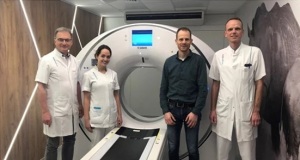por
John R. Fischer, Senior Reporter | March 05, 2024

Professor Mathias Prokop (left) with Canon's newly installed photon-counting CT scanner at Radboud University Medical Center in The Netherlands.
Canon Medical Systems has installed the second of its photon-counting CT scanners worldwide at Radboud University Medical Center (RUMC), in the Netherlands, allowing the institution to officially kickstart a research study to assess the clinical use of PCCT for ultralow-dose imaging, quantitative evaluation of contrast media, and more.
The study commenced in January and has already confirmed the technology produces improved spatial resolution, says professor Mathias Prokop, chairman of the department of Radiology at RUMC.
“As a chest radiologist, I’m excited to see that our diagnostic abilities may be pushed past their current limits. Together with Canon, we plan to further explore the scanner’s spectral imaging features. By combining it with existing techniques like subtraction or perfusion imaging we’d like to venture into functional imaging as well,” he said in a statement.



Ad Statistics
Times Displayed: 16169
Times Visited: 33 Final days to save an extra 10% on Imaging, Ultrasound, and Biomed parts web prices.* Unlimited use now through September 30 with code AANIV10 (*certain restrictions apply)
RUMC and Canon signed a joint clinical research agreement in November to study the early practical application of PCCT, which decreases pixel size and improves spatial resolution in images by converting individual X-ray photons into an electrical signal using its photon-counting detector.
This process allows it to detect lesions and produce ultrahigh-resolution scans of large anatomies at lower radiation exposures as well as visualize minute details in organ structures, improve tissue characterization, and provide more accurate material density measurements or quantitation. The solution is expected to be the next generation of CT.
Through the study, RUMC researchers are hoping to use direct input from clinical practice to accelerate the technology’s development and create the best possible version of the scanner for use in these settings.
"We think higher resolution PCCT has the possibility to depict a more detailed structure and improve the detectability of lesions as compared to EID-CT," Canon told HCB News. "We plan to explore the potential and performance of PCCT through clinical research and confirm the usefulness of PCCT in each area."
Canon, which is based in Japan, has also partnered with the National Cancer Center Exploratory Oncology Research & Clinical Trial Center, Hospital East, and Hiroshima University there to conduct clinical research on PCCT.
RUMC researchers will discuss their firsthand experience of using PCCT at the European Congress of Radiology annual meeting in Vienna. Canon will also be showcasing its CT solutions there.
Back to HCB News

